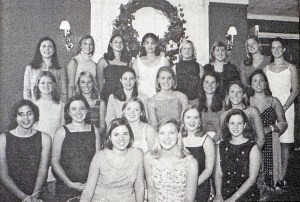Mark Millican: They braved ‘Desperate Ground’
Published 2:30 pm Monday, March 25, 2024

- Mark Millican
After finishing “Killing Patton,” the book by Bill O’Reilly and Martin Dugard that drills deeply into legendary Gen. George S. Patton’s military leadership and mysterious death in World War II, another book in a corner pile of our Ellijay home caught my attention, “On Desperate Ground: The Epic Story of Chosin Reservoir — the Greatest Battle of the Korean War” by Hampton Sides. The latter paints a not-so-glowing portrait of another WW II general, Douglas MacArthur, and his command actions during the Korean War.
One can’t help comparing and contrasting Gens. MacArthur and Patton, both powerful yet flawed leaders. Each possessed enough hubris to rise above a pantheon of gods in a Greek tragedy, and some historians say their pursuit of vainglory unnecessarily cost the lives of American troops when such casualties could largely have been avoided.
Trending
Sides writes in his prologue that U.S. Marines became engaged “in one of the more harrowing clashes in the history of warfare” in late 1950 at North Korea’s Chosin Reservoir. It wasn’t just the odds — 30,000 United Nations troops under the command of Maj. Gen. Oliver Smith versus 120,000 Chinese Communist combatants who had crossed the North Korean border. Temperatures got down to between 30 and 50 degrees below zero. Then there was MacArthur’s grandiose, ill-conceived strategy to push deeper into North Korea toward the Yalu River that included a stretch of mountains with a single road — 100 miles long — for transporting war equipment, maintaining supply lines and evacuating the wounded.
A sycophantic officer under MacArthur blithely asked Smith, “What casualties?”
After meeting with MacArthur in Tokyo, Smith was suspicious of his intentions. MacArthur is described in the book as being “a man in love with the vertical pronoun … (and possessing) a solemn regard for his own divinity.” Smith felt much of the supreme commander’s world was “weird and cultish … (he was) surrounded by yes men.”
“As the pieces slowly came together, (Smith) could intuit the battlefield for what it would become — a perfect trap,” the book states. MacArthur disregarded reports of thousands upon thousands of Chinese troops infiltrating the mountains who would attack in wave after wave of assaults.
Dean Acheson, President Harry Truman’s secretary of state, was particularly incisive about MacArthur during a Cabinet meeting.
“Acheson had trouble understanding how MacArthur had put U.N. forces in such a position, how his intelligence had been so wrong, and how he had delayed for so long before honestly confronting the situation he faced,” according to “On Desperate Ground.” “The supreme commander had come close to digging a hole, Acheson said, without an exit. The secretary of state thought that, somewhere along the way, MacArthur had lost touch with reality — he seemed hysterical at times, even delusional. In describing him, Acheson would later quote Euripides: ‘Whom the gods would destroy they first make mad.’”
Trending
In an afterword to the book, the author states his belief that MacArthur, “having created a top-down structure in Tokyo, was criminally out of touch with reality, (presiding over) one of the worst intelligence failures, one of the worst leadership failures, in American military history. His decisions, so carelessly arrived at, led to the needless deaths of thousands of Americans.”
As well, Sides unflinchingly describes the effects of the cold and combat on both armies, the outright heroism of U.S. fighting men, and other facets of the battle such as rebuilding a bombed-out bridge for the retreat to the coast, the refugee crisis, machinations at the U.N. and with Chinese Chairman Mao Zedong, and MacArthur being relieved of command in 1951 by Truman for insubordination to the president. Then there’s the incredible story of a Naval aviator crash-landing his own plane to help his friend, the first Black fighter pilot in the U.S. Navy, who had been shot down. The account is riveting and resulted in a Medal of Honor being awarded.
To a man, Marines felt that without the calm and methodical Gen. Smith at the helm all would have been lost and even more would have died. Smith was modest.
“There was a plan, and that plan was carried out,” he related simply. “I knew what we had to do, and I never for a moment doubted we could do it … Some attributed the result to the individual bravery and determination of the officers and men. But more than that was required. One of my regimental commanders summed it up in this fashion: He stated that he was not a religious man, but he felt that we had walked in the hand of God.”
One Marine was more succinct about Smith: “I’d follow him to hell because I know he’d get me out.”
After reading other Hampton Sides books — “Ghost Soldiers: The Epic Account of World War II’s Greatest Rescue Mission” (which became a movie), “Blood and Thunder” (about Kit Carson and the American West) and “In the Kingdom of Ice: The Grand and Terrible Polar Voyage of the USS Jeannette” — I’ve become a huge fan. Now, I feel that “On Desperate Ground” is one of the best books I’ve ever read.
Korea is sometimes called “America’s Forgotten War.” However, with this unforgettable account of the Battle of Chosin Reservoir, that moniker should be retired.
Mark Millican is a former staff writer for the Dalton Daily Citizen.




